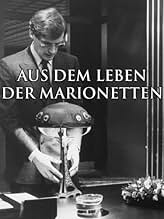IMDb रेटिंग
7.2/10
5 हज़ार
आपकी रेटिंग
अपनी भाषा में प्लॉट जोड़ेंAn account of the events before and after a murder committed by a disturbed businessman in a strained marriage, and what led him to perform such a shocking act.An account of the events before and after a murder committed by a disturbed businessman in a strained marriage, and what led him to perform such a shocking act.An account of the events before and after a murder committed by a disturbed businessman in a strained marriage, and what led him to perform such a shocking act.
- पुरस्कार
- कुल 1 जीत
Paul Bürks
- The Assistant in the fashion show
- (बिना क्रेडिट के)
फ़ीचर्ड समीक्षाएं
Bergman was on top form writing this piece - there's lots to think about. What motivates a respectable man, whose mental state indicates only a small risk of self-harm, to undertake such a violent and frenzied crime? Do the ulterior motives and actions of those around him (wife, shrink, wife's business partner...)deliberately or unwittingly trigger the crime - or indeed are those sub-plots entirely incidental to the central event? These questions are not answered - they are raised and illuminated.
This is not Bergman's greatest piece of cinema - the mixture of documentary, drama and flashback can be a little disorienting - but the argument of the film drives on relentlessly and it is compulsive watching. Well worth seeing.
This is not Bergman's greatest piece of cinema - the mixture of documentary, drama and flashback can be a little disorienting - but the argument of the film drives on relentlessly and it is compulsive watching. Well worth seeing.
Perhaps I'm biased as I am a great admirer of Ingmar Bergman, but I found myself both fascinated and impressed by From the Life of the Marionettes. Excepting All These Women, the only film(of those I've seen, which is a little over two-thirds) that I didn't care for, Bergman's films have ranged to solid to outstanding. From the Life of the Marionettes is not one his very finest, but it is one of the films of his that is close to outstanding. Apart from the I agree underdeveloped homosexual subplot, there is very little of the film to criticise. The production values could be seen as stark, but still sublime and even haunting and shot beautifully. Bergman directs superbly with his usual control and discipline, while the speeches are thoughtful and the structure consisting of drama, documentary, character study, flashback and dream sequences is constantly attention-grabbing and I didn't find myself confused by it. The characters could be seen as cold, but purposefully and there is the trademark compelling realism of Bergman's films here. There aren't Sweden's finest ever actors on board, but the acting is still very good. All in all, very undervalued Bergman with lots of interest value. 9/10 Bethany Cox
Despite having seen the best part of Höstsonaten, Bergman's film immediately prior to Aus dem Leben der Marionetten, I never completed the viewing experience. Thus, this ranks itself as my very first Bergman, something I'd been rather looking forward to for quite some time.
Beginning with a surprising scene in which a well dressed man strangles a prostitute, Aus dem Leben der Marionetten follows this event up by examining the events before and after it, hopping through a time frame of two to three months. Through the conversations which precede and follow this catastrophe—as the film's intertitles elect to label it—we learn gradually more about the reasons and the people behind it.
I have a very deep proclivity toward non-English films playing late at night on television, particularly those in German—simply because I'm a student thereof. In the fleeting moments between realising such a film directed by the acclaimed Bergman—of whom I regrettably knew rather little—was about to grace my screen and its beginning, I was somewhat disenchanted to learn that this is not considered amongst his greatest. Nevertheless, I happily sat back to watch the potential magic unfold. The opening scene of murder is a strange one, the severity of the violence neither understood by its recipient or indeed by us; verily, it is suggested that not even the assailant understands what he is doing. Thereafter, an intriguing thing happens: the colour drains from the film, turning the previous rich reds to a dull monochrome. This effect is fascinating, inviting us to ruminate upon its purpose more than beginning in black and white would have done. The film follows this up with a non-chronological narrative progression, ducking from past to future—considering the murder the present, of course. Most of these scenes take the form of intimate conversations or extended monological musings, discussing in a vague manner many aspects of life. These are beautifully shot, a scene in which a homosexual man addressing the killer's wife slowly comes to regard himself in the mirror completely entrancing and surprisingly tender. Noteworthy too are the dream sequences—most rife in the film's middle section—dazzlingly bright and beautifully narrated. These exhibit a visual flair as inherently important to an understanding of the film as any dialogue. The film is both visually and thematically interesting, examining through both the factors that drive ordinary people to brutal actions. Somewhat of a recondite piece, it is the kind of film that lingers with you, returning to your mind a number of times after viewing. The performances, particularly that of Martin Benrath—in the role of the aforementioned gentleman—are nothing short of arresting.
Containing a cornucopia of pleasing visuals and highly effective metaphors—the importance of mirrors springs to mind—Aus dem Leben der Marionetten is a voluptuous treatise on life and love; repression and expression; individuality and relationships. Slow moving, but completely involving, if this is a lesser Bergman, I can't wait to see how he could improve upon it.
Beginning with a surprising scene in which a well dressed man strangles a prostitute, Aus dem Leben der Marionetten follows this event up by examining the events before and after it, hopping through a time frame of two to three months. Through the conversations which precede and follow this catastrophe—as the film's intertitles elect to label it—we learn gradually more about the reasons and the people behind it.
I have a very deep proclivity toward non-English films playing late at night on television, particularly those in German—simply because I'm a student thereof. In the fleeting moments between realising such a film directed by the acclaimed Bergman—of whom I regrettably knew rather little—was about to grace my screen and its beginning, I was somewhat disenchanted to learn that this is not considered amongst his greatest. Nevertheless, I happily sat back to watch the potential magic unfold. The opening scene of murder is a strange one, the severity of the violence neither understood by its recipient or indeed by us; verily, it is suggested that not even the assailant understands what he is doing. Thereafter, an intriguing thing happens: the colour drains from the film, turning the previous rich reds to a dull monochrome. This effect is fascinating, inviting us to ruminate upon its purpose more than beginning in black and white would have done. The film follows this up with a non-chronological narrative progression, ducking from past to future—considering the murder the present, of course. Most of these scenes take the form of intimate conversations or extended monological musings, discussing in a vague manner many aspects of life. These are beautifully shot, a scene in which a homosexual man addressing the killer's wife slowly comes to regard himself in the mirror completely entrancing and surprisingly tender. Noteworthy too are the dream sequences—most rife in the film's middle section—dazzlingly bright and beautifully narrated. These exhibit a visual flair as inherently important to an understanding of the film as any dialogue. The film is both visually and thematically interesting, examining through both the factors that drive ordinary people to brutal actions. Somewhat of a recondite piece, it is the kind of film that lingers with you, returning to your mind a number of times after viewing. The performances, particularly that of Martin Benrath—in the role of the aforementioned gentleman—are nothing short of arresting.
Containing a cornucopia of pleasing visuals and highly effective metaphors—the importance of mirrors springs to mind—Aus dem Leben der Marionetten is a voluptuous treatise on life and love; repression and expression; individuality and relationships. Slow moving, but completely involving, if this is a lesser Bergman, I can't wait to see how he could improve upon it.
A complex dissection of a murder and a murderer, told by jumping back and forth in time, before and after the event, A deeply disturbing portrait of a man and a society so cut off from feeling that violence seems almost inevitable.
While more divided in public reaction then some of Bergman's most beloved works, I think this edgy, bold, uncomfortable film ranks close to some of his best work. While there are moments of pretension, there's also a lot of human and psychological complexity (and wonderful acting) in this bleak exploration of how near murder and madness lie to any of us.
While more divided in public reaction then some of Bergman's most beloved works, I think this edgy, bold, uncomfortable film ranks close to some of his best work. While there are moments of pretension, there's also a lot of human and psychological complexity (and wonderful acting) in this bleak exploration of how near murder and madness lie to any of us.
Pros:
1. The movie begins with an eye-catching opening which is simultaneously tense, suspenseful, and unflinchingly brutal. It also serves as an intriguing view into the main character.
2. The flashbacks are presented with a black-and-white colour palette, which is just a nice and simple way of delineating them from the present.
3. Both Robert Atzorn (Peter Egermann) and Christine Buchegger (Katarina Egermann) deliver fantastic performances.
4. The film serves as a fascinating insight into the mind of a psychopath who also happens to be suffering from marriage and sex issues.
5. The cinematography, especially in regards to the framing of the shots, is sharp and concise.
Cons: 1. The sound design is a little off at times. 2. The continuous sex, and sex-related content, starts to get a little repetitive. 3. The movie, at times, feels too pretentious which pulls the viewer out of the immersion.
Cons: 1. The sound design is a little off at times. 2. The continuous sex, and sex-related content, starts to get a little repetitive. 3. The movie, at times, feels too pretentious which pulls the viewer out of the immersion.
क्या आपको पता है
- ट्रिवियाAus dem Leben der Marionetten (1980) is Director Ingmar Bergman's only movie shot in the German language. The Serpent's Egg (1977) was shot in Germany, too, but mostly in English.
- कनेक्शनFeatured in Drugoe Kino: From the Life of the Marionettes (2006)
- साउंडट्रैकTouch Me, Take Me
Performed by Rita Wright
टॉप पसंद
रेटिंग देने के लिए साइन-इन करें और वैयक्तिकृत सुझावों के लिए वॉचलिस्ट करें
विवरण
- रिलीज़ की तारीख़
- कंट्री ऑफ़ ओरिजिन
- भाषा
- इस रूप में भी जाना जाता है
- From the Life of the Marionettes
- फ़िल्माने की जगहें
- उत्पादन कंपनियां
- IMDbPro पर और कंपनी क्रेडिट देखें
बॉक्स ऑफ़िस
- दुनिया भर में सकल
- $4,293
- चलने की अवधि1 घंटा 44 मिनट
- रंग
- ध्वनि मिश्रण
इस पेज में योगदान दें
किसी बदलाव का सुझाव दें या अनुपलब्ध कॉन्टेंट जोड़ें

टॉप गैप
By what name was Aus dem Leben der Marionetten (1980) officially released in India in English?
जवाब




























